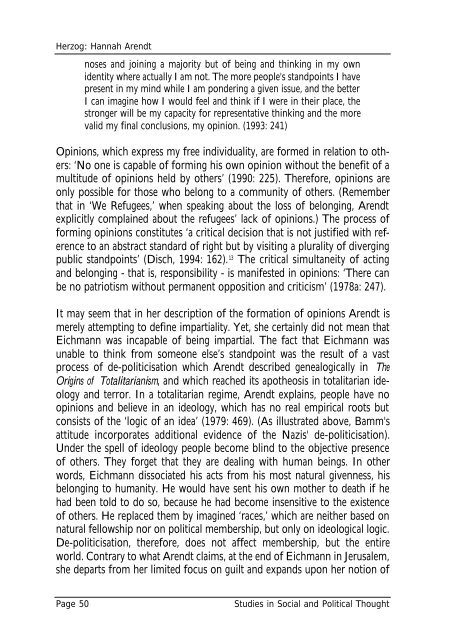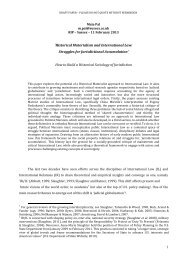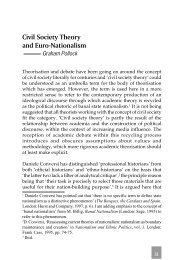Hannah Arendt's Concept of Responsibility - University of Sussex
Hannah Arendt's Concept of Responsibility - University of Sussex
Hannah Arendt's Concept of Responsibility - University of Sussex
You also want an ePaper? Increase the reach of your titles
YUMPU automatically turns print PDFs into web optimized ePapers that Google loves.
Herzog: <strong>Hannah</strong> Arendt<br />
Page 50<br />
noses and joining a majority but <strong>of</strong> being and thinking in my own<br />
identity where actually I am not. The more people's standpoints I have<br />
present in my mind while I am pondering a given issue, and the better<br />
I can imagine how I would feel and think if I were in their place, the<br />
stronger will be my capacity for representative thinking and the more<br />
valid my final conclusions, my opinion. (1993: 241)<br />
Opinions, which express my free individuality, are formed in relation to others:<br />
‘No one is capable <strong>of</strong> forming his own opinion without the benefit <strong>of</strong> a<br />
multitude <strong>of</strong> opinions held by others’ (1990: 225). Therefore, opinions are<br />
only possible for those who belong to a community <strong>of</strong> others. (Remember<br />
that in ‘We Refugees,’ when speaking about the loss <strong>of</strong> belonging, Arendt<br />
explicitly complained about the refugees’ lack <strong>of</strong> opinions.) The process <strong>of</strong><br />
forming opinions constitutes ‘a critical decision that is not justified with reference<br />
to an abstract standard <strong>of</strong> right but by visiting a plurality <strong>of</strong> diverging<br />
public standpoints’ (Disch, 1994: 162). 13 The critical simultaneity <strong>of</strong> acting<br />
and belonging - that is, responsibility - is manifested in opinions: ‘There can<br />
be no patriotism without permanent opposition and criticism’ (1978a: 247).<br />
It may seem that in her description <strong>of</strong> the formation <strong>of</strong> opinions Arendt is<br />
merely attempting to define impartiality. Yet, she certainly did not mean that<br />
Eichmann was incapable <strong>of</strong> being impartial. The fact that Eichmann was<br />
unable to think from someone else’s standpoint was the result <strong>of</strong> a vast<br />
process <strong>of</strong> de-politicisation which Arendt described genealogically in The<br />
Origins <strong>of</strong> Totalitarianism, and which reached its apotheosis in totalitarian ideology<br />
and terror. In a totalitarian regime, Arendt explains, people have no<br />
opinions and believe in an ideology, which has no real empirical roots but<br />
consists <strong>of</strong> the ‘logic <strong>of</strong> an idea’ (1979: 469). (As illustrated above, Bamm's<br />
attitude incorporates additional evidence <strong>of</strong> the Nazis' de-politicisation).<br />
Under the spell <strong>of</strong> ideology people become blind to the objective presence<br />
<strong>of</strong> others. They forget that they are dealing with human beings. In other<br />
words, Eichmann dissociated his acts from his most natural givenness, his<br />
belonging to humanity. He would have sent his own mother to death if he<br />
had been told to do so, because he had become insensitive to the existence<br />
<strong>of</strong> others. He replaced them by imagined ‘races,’ which are neither based on<br />
natural fellowship nor on political membership, but only on ideological logic.<br />
De-politicisation, therefore, does not affect membership, but the entire<br />
world. Contrary to what Arendt claims, at the end <strong>of</strong> Eichmann in Jerusalem,<br />
she departs from her limited focus on guilt and expands upon her notion <strong>of</strong><br />
Studies in Social and Political Thought
















